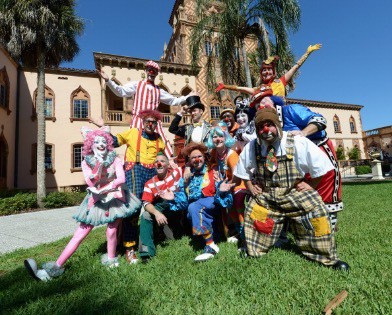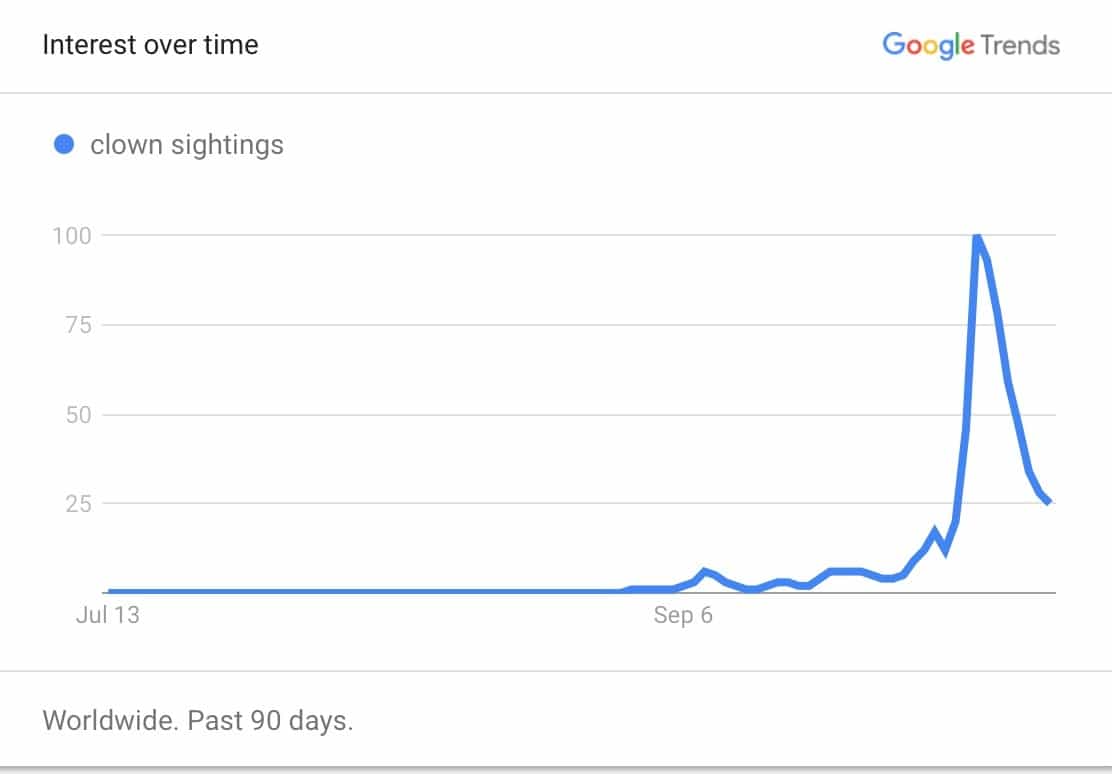Time to stop clowning around
There has been something of a rash of clown-related incidents which seem to have swept across the USA and similar cases are now being reported in the UK. It isn’t wholly clear how many of the reported incidents are real or indeed how serious they are but one thing is for sure there is some major clown hysteria out there and a lot of it seems to be focused, for no obvious reason, on university campuses.
This article provides a handy summary of the clown phenomenon in the US going back to the 50s and notes a recent incident at Pennsylvania State University where
students mobbed streets around campus searching for clowns fellow students had supposedly seen on campus. Police, when asked, said they had no reason to believe the rumours.

Interest does appear to have peaked though.
Times Higher Education recently reported on the “craze”:
Reports of people dressed in creepy-looking clown costumes stalking college campuses have now occurred at dozens of institutions. Students have reported seeing clowns at the universities of Connecticut, Iowa, Massachusetts, Miami, Missouri at Columbia and Texas at Austin. Students have claimed to also have seen clowns at Bloomsburg, Butler, Sacred Heart, Texas A&M and Syracuse universities, as well as at Mississippi and York colleges.
Some institutions have chosen to not address the reports publicly, other than to send police to investigate the claims. Other institutions – including several that experienced alleged clown sightings recently – have responded to the reports more directly.
On the same day, the University of New Hampshire informed students that police were unable to substantiate any clown sightings on campus and that the university was not on lockdown, despite rumours to the contrary. That same evening, reports of clowns at Auburn University prompted officials to send a campuswide email instructing students to resist the urge to track down clowns on their own and to avoid wearing clown attire.
“We had a report of students walking around looking for people dressed as clowns,” the university’s department of public safety said in the email. “For your safety, we strongly encourage you to leave this job to Auburn Police. Please use good judgment and avoid wearing clown masks, as it could be perceived as a hazard or threat to others.”
Also this example of a “chainsaw-wielding clown” at Brunel University who claimed the whole thing was a prank.
It’s all a bit scary. But what of the consequences for real clowns? And for the serious business of training clowns? Clown College has to be in trouble, surely.

And the future is probably not too bright for Clown Camp.
There are also stories, such as this one in Nottingham, about clowns fearing for their employment in the context of a backlash against clowns.
A professional clown has urged anyone considering taking part in the ‘killer clown’ craze to use their energy on making people happy, rather than scared.
Jolly Jingles, who works out of Long Eaton, said the clowning profession is there to bring people joy and love rather than fear.
On Monday, police confirmed they were investigating after a person in a full clown costume jumped out and scared a woman in Toton. Inspector Steven Wragg warned anyone taking part in the craze could be prosecuted.
The clown, who didn’t want to give his real name to the Post for fear of ruining the illusion for the children he performs for, said: “People need to think about the effect they are having on that person who they are scaring.
So, great for tabloid headline writers but not that good for the coulrophobes who now see clown pictures everywhere or the real clowns themselves and clown trainers.
(Thank you to everyone who has suggested the urgent need for a True Crime on Campus clown special edition).












